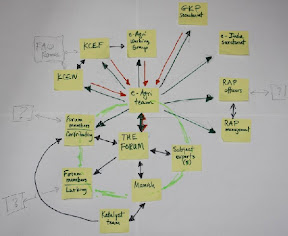Learning is next to godliness ... somehow my PLN of my early years managed to sink that value deep into me. Although caught up in the day-to-day demands of large organizations and professional "carrots and sticks," I think it becomes possible to lose track of this. PLN play a vital role not only for one self, but also for others as:
- part of our own "continuing education" for professional and personal development
- something to be instilled in others; key role in mentoring and managing
My mind has already got me thinking of how the Web2.0 technologies will impact our PLN. The article talks about Twitter.
Personally I'm fascinated thinking of the cultural and organizational impact of technology such as Twitter ... an enclosed classroom or meeting room, or a delimited group of individuals, is suddenly opened up to the Global Village. Of course opening up can be good or bad, depending on one's perspective. Not all would be comfortable with, welcome, or find value in this level of exposure. I doubt there will be Twittering in my office's meetings anytime soon!
It would seem there is the potential for too much of a good thing here, although Twitter's website does say it is the "modern antidote to information overload." There certainly is a need for limiting or filtering, and this is why the role of an established, defined networks is so very important.
But the potential for valuable input is phenomenal.
